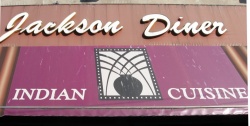From The Peopling of New York City
Jackson Heights is primarily a South Asian ethnic neighborhood. One can confidently expect that most of their customers will belong to one of a few ethnic groups. Those ethnic groups often have very different tastes and customs regarding food, making it difficult to Americanize. For example, Muslims such as Pakistanis and Bangladeshis only eat halal meat and will not eat pork, whereas Hindus do not eat beef and are sometimes vegetarian. Both pork and beef are common items in an average American’s diet. The way the ethnic food is Americanized shows an understanding of other ethnic cultures, as well as well as a strong business sense.
Acknowledgement of Surrounding Ethnic Groups
Rather than directly “Americanizing” their menu, restaurant owners may simply choose to diversify their market. One such way is to Americanize their menus while paying attention to cultural and ethnic differences in tastes. This is possible because while there are differences in acceptable foods between the various ethnic groups in Jackson Heights, there are many more similarities. For one, vegetarian menu is almost always acceptable for any ethnic group. Of course there are more than just vegetarian menus that are acceptable for any ethnic group. They are just the most widely acceptable, and thus one of the most common.
Emphasis on Speed
Part of the “American” culture is to have things quick and fast. The many success of McDonalds, Burger King, Kentucky Fried Chicken, Taco Bell, and many other fast food restaurants around America are enough proof that Americans generally like things quick and fast. Ethnic restaurants around Jackson Heights have attempted to copy their success. One way restaurants have sped up food preparation is by pre-cooking their food; merely keep it warm until a customer orders it. Another is by using modern kitchen time savers, such as microwave ovens, to quickly make basic foods such as roti and rice.
This aspect of Americanization plays an important part on what a restaurant's menu.
Consistency in Taste
When people become regular customers of a restaurant, it is because they can expect to enjoy the meal, rather than looking forward to the differences between the last meals they had there. The many successful fast food restaurants practice this idea across America. When you buy a Big Mac or a Whopper, you can expect each Big Mac and Whopper to taste the same, even if you bought it at different stores! Many ethnic restaurant owners began to realize that their customers demand a certain amount of consistency and thus, when you order dosa from a certain store, you can expect the dosa to taste the same when you come again.
Diluting the Flavor
Compared to the food in McDonalds and Burger King, the ethnic food in Jackson Heights has very strong flavors, due to the assortment of spices and herbs not found in ordinary everyday American food. However, one of the complaints many immigrants in Jackson Heights make is that the food just tastes different, just isn’t as strong, just isn’t as good as it was in India. One reason may be the decreased amount of spices and herbs used. Not only does this save money, it also doesn’t scare away all Americans from tasting their food. Many Americans are not used to the many spices and herbs used, such as cumin and coriander powder. Many second generation immigrants who have not visited their family’s country often will not be concerned with the “lack” of flavor in the taste, and in fact may complain if it was stronger, as they have become accustomed to American food.
Food in the Future
In the future, the food offered in Jackson Heights will certainly change. However, how it will change is difficult to anticipate. It is safe to say that some restaurants will become even further Americanized. However, other restaurants will become more specialized, filling the niche that traditional and authentic food lovers make up. Eventually a balance will be formed, with restaurants dedicated to offer ethnic fast food or authentic ethnic food.


